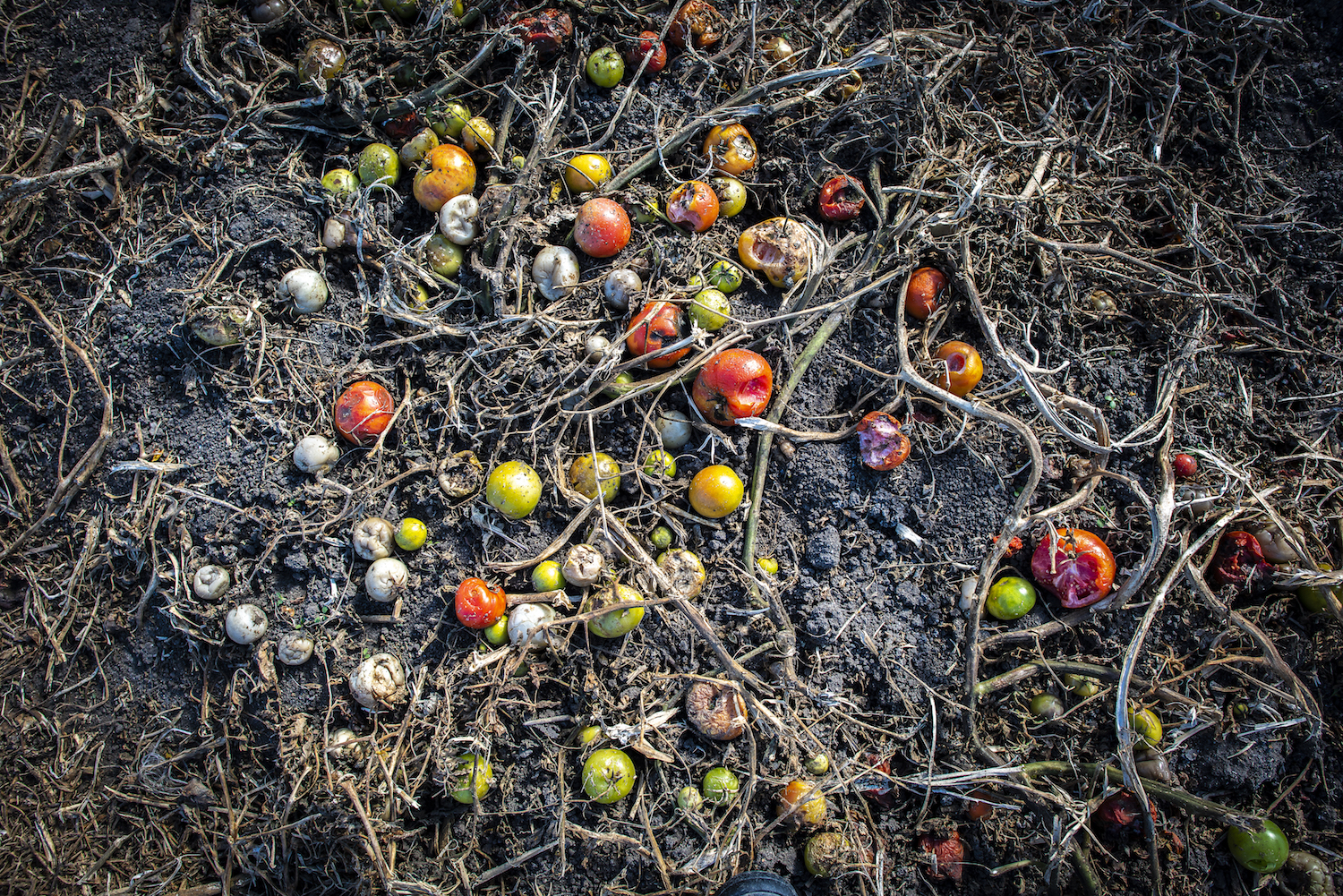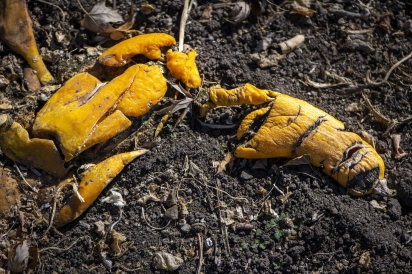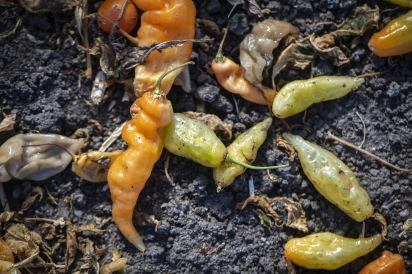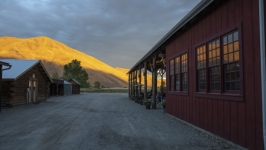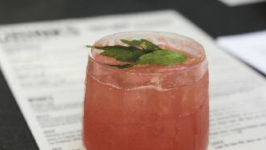Mining the Other Black Gold
The afternoon sun was just beginning to dip behind a bank of trees on the grounds of Chateau Des Fleurs in Eagle as Susan Roghani trundled through her large, on-site garden, picking tomatoes that spurted as she bit into them and shaking her head at her cucumbers, which she said didn’t turn out as well as she had hoped. She stopped to admire a weed growing on the margins.
“I really love the weeds, too. When I turned 50, my husband had a surprise party and my daughter created this series of questions, and it was, like, ‘OK, what is Susan’s favorite flower?’ and you got a point if you got it right. It was weeds,” Roghani said.
Roghani and her family own the 40-acre Chateau Des Fleurs compound, which includes a restaurant, Le Coq d’Or; the chateau itself, which is frequently used for weddings; a Camille Beckman skin cream and lotion facility; and acres of gardens, forest, orchards, an old dairy farm, pasture and other open spaces. It’s an expansive, European-style country estate in the heart of west Ada County suburban development.
Keeping a picture-perfect garden free of weeds is a chore for any gardener—“You can’t expect it to be beautiful,” she said. “You can’t expect an organic garden, a big one, to look gorgeous all the time. You just can’t.”—so rather than wring her hands over dandelions and thistles, Roghani lets them serve a purpose. Which weeds are growing where can say a lot about soil quality, nutrients, water and more. And when she plucks them, she tosses the weeds directly onto one of several compost piles distributed across the garden. Throw on top some scraps from the kitchen, a few unusable fruits and plant husks and a bit of lamb manure, and she has an ample source of fresh soil to keep her garden going.
“If you mix all those things together, it becomes an open buffet and your plants can grab those minerals. And then you have such energy,” she said.
Walking in the space between crops, Roghani approached one of the compost piles, approximately four feet high and studded with crumbly dung, papery tomatillo bulbs and a yellow fruit that had cracked open like a geode. The composting materials can come from just about anywhere. The kitchen has been a steady source, and the staff there regularly sends scraps the garden’s way. The fresh green stuff provides nitrogen, a crucial ingredient for fertile soil. The brown stuff provides carbon. Roghani’s source for that are the lambs that spend their days eating their way across a five-acre plot; every so often, she hauls a few bags of their droppings to the garden, shoveling it onto her compost piles.
Every year, Roghani said, she generates enough compost to fill about two semi-trailer truck beds. It fuels her garden, and approximately 25% of the fruits of her garden go back to the kitchen, the scraps from which return to the compost piles. It’s a closed circuit where every plant plays a role.
“I believe the plants ... are going to bring up the stuff we need to be putting back into the ground,” Roghani said.
Not all restaurants have composting programs, and most of those that do measure their available space in square feet rather than acres.
“We’re notorious for having very cramped restaurant design, but every chair, every table, every extra seat during peak times is the revenue that keeps us all employed. Up here, everything gets utilized,” said Dave Roberts, beer and brand manager at Bittercreek Ale House, Red Feather Lounge and Diablo & Sons.
The construction of Diablo & Sons, which now occupies the former location of Pollo Rey at the corner of Eighth and Idaho streets in downtown Boise, impacted Bittercreek’s composting program “negatively,” Roberts said. The basement beneath Bittercreek and Red Feather is a maze of food preparation rooms, water and electrical nooks and a VIP area. Diablo & Sons has added to the size and complexity of the underground works, and it has left the composting bin somewhat less well-attended than it had been before construction started.
“When everybody’s stressed out trying to work around construction, their ability to do other stuff like process and serve worms food is just interrupted. The worms are still happy and healthy, and set to compost a ton of food,” Roberts said.
Bittercreek began its worm composting program in 2009 with a single, tall bin in a room currently occupied by the walk-in refrigerator. Nine years later, two four-foot-by-seven-foot bins were constructed in a smaller room. They were named “Arrakis” and “Dune” after the science fiction preferences of former Sustainability Director Amy Lyons, who left in 2018 after several years of overseeing the program.
When Edible Idaho toured the composting room, Dune had been temporarily repurposed for storage, but the surface of "Arrakis" was strewn with shredded old menus, and writhed with earwigs, roly polys and the occasional worm. Roberts misted it with a hose and a warm, earthy smell rose from the bin. Under normal circumstances, 40 pounds of everything from romaine butts and cucumber skins to tomato ends and kale stalks would go from the prep kitchens into a processor Roberts called the “rotten food machine,” which would shred and dry the scraps before being laid into the bins, but during construction, the worms were fed unprocessed food less frequently.
“The worms have been on life support for a little while, where I’ll feed them larger chunks, and because the larger chunks take more time to get processed, I feed [the worms] less frequently,” Roberts said.
Once Diablo & Sons is open for business, Roberts said the company will hire a new sustainability director, rev up the rotten food machine and start filling Dune, but for now, larger, unprocessed food is going into the bin less frequently, taking the worms longer to digest the bacteria that grows on the surface of the food and slowing the production of “black gold”—the high-quality compost spilling out from the underside of the bin.
It’s high-value compost that Bittercreek has distributed at local open-air markets and, most often, to local farmers. Despite its value, however, Roberts said the composting program will likely never be large or productive enough to financially justify the space it takes up in the basement. Rather, it has become part and parcel to the company’s mission, which stresses sustainability efforts and environmental awareness. Just like doctors are experts on the human body, and accountants are experts with money, Roberts said restaurants should be experts on food.
“Humans by their nature are consumptive, and one of the most consumptive things they do is eat and drink stuff,” he said. “By virtue of being a restaurant, we have the opportunity to help people eat more sustainably than they could on their own.”
Like the composting bins at Bittercreek, the bin at the Moscow Co-op had a name: “Eartha.” The Co-op purchased it in 2007, two years after moving into its current location. It then purchased a second composter, “Bertha,” in 2016 from the Main Market Co-op in Spokane, Washington. The two bins together are able to process approximately 6,000 pounds of food per month. Unlike the bins at Bittercreek, they reek.
“They’re no joke, and they smell horrible, and they’re really big, and no one wanted to walk down our alley,” said Moscow Co-op Marketing Manager Alycia Rock.
When the co-op first purchased Eartha, it was doing about $6.5 million in sales per year. As the business grew, so did the smell. A decade later, its sales have nearly doubled, to about $11 million in sales per year. Meanwhile, an estimated 60% of the food that goes into the bins has come from the deli—historically one of the highest-earning departments of any grocery store. The growth has generated a lot of food waste, and the smell intensified.
In spring of 2018, the co-op moved the composters to the Palouse-Clearwater Environmental Institute. The co-op’s departments still collect their compostable waste, which, in addition to kitchen scraps and post-expiration-date fruits and veggies, now includes compostable tableware, pizza boxes, toilet paper rolls and more—and send them to PCEI.
“There they live in nature creating compost. They’re warm, they still stink, and they’re covered by a roof thing so they don’t get wet,” Rock said.
The resulting compost is distributed to local farmers and co-op employees, closing a circle of production that begins with locally produced food and ends with local compost. Rock said that circle is built into the co-op’s mission, and as it has expanded its footprint since opening in 1973, the company has found practical limits to achieving its mission, at least on site. By forging a partnership in the community, it has found a way to continue.
“It can be such an intense agent of change, which is why I get so excited and giddy about food composting and waste, but also about farmers and livestock,” Rock said. “It just makes a lot of sense to me to have this kind of model.”
Chateau Des Fleurs | @chateaudesfleursofficial
Bittercreek Ale House
Red Feather Lounge
Diablo & Sons
Moscow Co-op
Main Market Co-op
Alycia Rock
Palouse-Clearwater Environmental Institute


